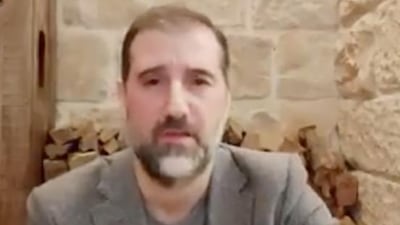Mohammad Makhlouf, maternal uncle of Bashar Al Assad and one of Syria’s most powerful men until a recent public rift with the president fundamentally altered the makeup of the regime’s inner circle, has died.
His son, the tycoon Rami Makhlouf, said he bid farewell to his 88-year-old father on Saturday.
“We did not organise a wake because of the circumstances related to the coronavirus pandemic,” Mr Makhlouf said on Facebook.
Syrian opposition media said the older Mr Makhlouf died in Syria of the coronavirus, although he had reportedly moved to Moscow six years ago.
Mohammad Makhlouf's rise to the top of the business hierarchy and decision-making in Syria started after Hafez Al Assad took power in a 1970 coup and appointed him to run the oil sector and the country's nationalised banks.
Mr Makhlouf became the manager of the inner circle's finances. He put his son Rami in charge of his business empire after Bashar Al Assad inherited the presidency in 2000 and the regime awarded the Makhloufs more monopolies, such as telecommunications and real estate.
Bankers said Mr Makhlouf continued pulling the business strings from behind the scenes as Rami Makhlouf became the public face of Syria’s economy and its transformation to a partially liberalised system.
But liberalisation was geared to benefit the Alawite elite and their associates from the Sunni merchant classes that had allied with the regime, contributing to the Syrian upheaval 11 years after the transfer of power to Bashar Al Assad.
After the death of Assad, Mohammad Makhlouf became known as Al Khal, or uncle in Arabic.
One Syrian oil services executive recalled how Mohammad Makhlouf made at least $500 million (Dh1.83 billion) from the sale of an oil concession he controlled to Chinese oil company Sinopec in the 2000s.
"It was a mere concession he received for free from Hafez Al Assad," the businessman, who was a partner of Makhlouf, told The National. "Mohammad did not move a finger and made half a billion dollars overnight."
Mr Makhlouf’s sister Anissa married Hafez Al Assad in the late 1950s. Mr Makhlouf at that time belonged to the Syrian Social Nationalist Party, an ultra-nationalist group modelled after the Nazi Party.
In the subsequent decade, Hafez Al Assad became defence minister and then president as a member of the group of mostly Alawite officers who took control of the state.
Mr Makhlouf also controlled the state-owned tobacco monopoly and was head of the state-owned Real Estate Bank by the time Hafez Al Assad died in 2000.
The Makhloufs' sway over the state rose sharply after 2000 and most senior officials, from the rubber-stamp prime minister to central bank governor, had to receive Mohammad Makhlouf’s approval before being appointed.
The Syrian uprising in March 2011 forced the Makhloufs to lower their profile. Mohammad Makhlouf reportedly left for Moscow a few years later, although Rami remained a major player in the war economy in Syria.
A rift between Mr Al Assad and Rami Makhlouf became public in May this year, exposing parts of the huge business and front company networks of the Makhloufs and the Assads.
The split deepened amid the financial meltdown in Lebanon and Rami Makhlouf was ousted from a triumvirate that rules Syria, and had comprised Rami Makhlouf, the president, and the president's brother, Maher.
Associates of the president's wife Asma have, in the past few months, replaced some of the business players linked to the Makhloufs in Syria and some see Asma as taking over portfolios that previously belonged to Mohammad Makhlouf and his son.


